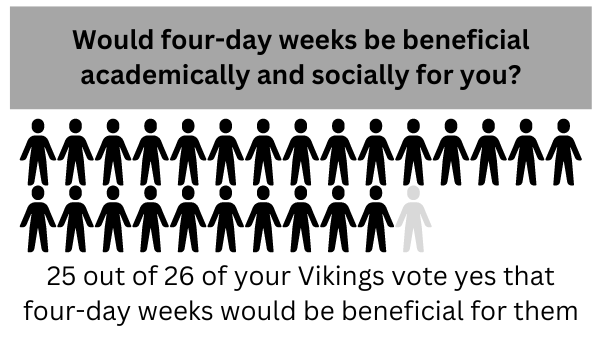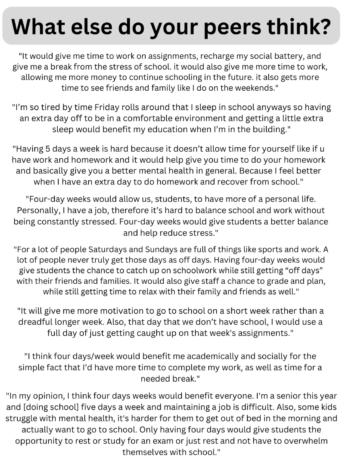Students “four” shorter weeks

GRAPHIC BY ANGIE TWOMBLY
November 28, 2022
School is one of those things that most can agree wears them out by the end of the week. I have stacks of homework every night, I am constantly tired and I have no time to pursue my hobbies. This is because I am always so focused on school.
Not to mention I also have an anxiety disorder which can cause me to be stressed out and feel overwhelmed by the end of the week.
According to Healthline, anxiety is normal amongst teens, especially with bullying, large crowds and unrealistic expectations set by parents and teachers.
Something that helped with this was during the month of September, Omaha Public Schools (OPS) provided students with three four-day school weeks.
Just in those three weeks, I was able to catch up on homework, clean my room and spend time with my friends.
I enjoyed being able to take the extra time to myself knowing I would have that extra day to catch up on work if I needed it. I also felt teachers expected us to use the day off to do work, given I heard the phrase, “you have a long weekend to get it done,” over and over.
According to Acasestudy, four-day weeks could help students by giving everyone extra work time, allowing for a social life, improving attendance and getting more sleep. It could also push students to become more motivated to do well in school.
Another benefit of four-day weeks is higher test scores. According to a study conducted by Direct.mit, students scored higher with four-day weeks versus when they had five-day weeks.
The other problem with five-day weeks is that most OPS schools have block scheduling which means there’s an uneven number of A- and B-days each week. This gives us more homework and less time to do it, or less homework but leaves our classes behind on coursework.
Five-day weeks also put many teachers behind in lessons they are supposed to teach us to “stay on schedule.”
Many people also take part in extracurricular activities. On average 30 percent of high school students have an after-school activity or job, not included in the average 3.5 hours of homework given to them every day, according to Zippia.
Burton Bosan, 11, spends a few days out of the week staying up until 2 to 3 a.m. just working on homework. Bosan feels as if a four-day week would make managing his job, work, school and sports easier.
“A four-day week would help prevent me from needing to stay up and finish homework,” Bosan said. “By giving me the weekend to work on it [I would] still be able to rest and take a break from school.”
Recently, just like Bosan, I have been staying up through the late hours of the night to work on my homework. I’ve taken measures to make my workload more manageable, such as shortening my work schedule to three days a week and even dropping a class. Still, I feel I don’t have enough time to complete my homework.
Staying up late to compensate for having a large workload has taken a toll on my sleep schedule.
According to Acasestudy, most high school students spend the last few hours of their night on an electronic device doing coursework that then keeps them up throughout the night.
Therefore, I, as well as many of my peers are not meeting the recommended eight hours of sleep.
Having that fifth day of the week off would give students a chance to catch up on sleep, or even spend the daytime working on their assignments rather than the long hours of the night.
“I would definitely be able to have more time to work and rest,” Savannah Wilson,12, said. “Homework seems to just pile up and never end, and it gets very stressful keeping it all in order.”
Schools could also use the extra day to offer support to students in need of one-on-one tutoring or mentoring from days they’ve missed or work they need help with.

Speaking of missing days, Direct.mit says that having the fifth day of the week off has reportedly increased student and teacher attendance. Parents can make appointments for their kids on their day off, and teachers can do the same as well. So, having a four-day week can help them miss less class time and keep up with their work.
Students also feel more motivated to go to class, have fewer behavioral issues, and the productivity levels among all members of a school are higher, according to Degree.lamar.
So, not only can students use the extra day and benefit from it, but so can our teachers. Having a teacher shortage has caused stress on teachers due to class sizes in addition to causing them to fall behind on grading and lesson plans, Acasestudy said on their website.
The extra day could give them in-service workdays to grade work and make flexible lesson plans that can adapt to all their students.
Math teacher, Katherine Zeeman, feels that a four-day week would give teachers more time to prepare for lessons and more time for themselves.
“A lot of teachers put a lot of themselves into teaching and they lose some of themselves trying to teach,” Zeeman said. “So, giving teachers some time to focus on themselves is important.”
Having four-day school weeks can also have advantages in the financial aspect. Schools save up on expenses like utilities, and water consumption. Lights are more likely to be off during the days and there will be fewer bathrooms and water fountains being used. Even with in-service days, not as much energy is being used throughout the school.
It has some disadvantages though, like all great things do, including possibly having to increase class time to make up for the days off, and having a harder time scheduling school activities and sports.
I would prefer longer classes if that means getting a day off every week.
Substitute teacher, Gay O’Neill, feels as if having a four-day week would make it difficult to schedule sporting events and practices.
Indeed, having that day off would in fact make it harder to schedule practices. However, it would make scheduling sporting events easier and cause students to decrease the amount of time they’re missing in class due to those events.
Shorter weeks would also be difficult for some students that rely on the free lunches provided by schools.
When I was in elementary school, I had the opportunity to be part of the “Backpack Program,” which gave kids free meals once a week to take home. So, even with having a day off every week, OPS has programs accessible to parents in need.
Even with childcare needs, according to OPS, there are many programs like Early Childhood Education, Kids Can, Girls and Boys club, and more that students of all ages can take part in. These all have financial aid and tuition help for people who can’t afford it.
Overall, having a four-day week would not only benefit the students, but it would also benefit the teachers. It would help with productivity in the classroom, raise attendance, improve sleeping habits and give everybody more time to work on homework and themselves.
Just like those three short weeks in September helped us, four-day weeks could positively impact our academic success.





